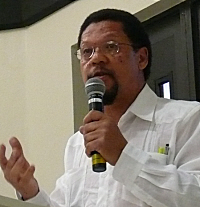
UVI and the United Nations Association of the Virgin Islands held forums in both districts, laying out the bills’ contents , with an expert panel opining on their pros and cons and benefits to this territory.
The first, co-sponsored by Delegates Donna Christensen of the U.S. Virgin Islands, Madeleine Bordallo of Guam and Eni Faleomavaega of American Samoa and adopted by the House, would fund educational programs in the three territories on political status options.
The bill was originally aimed at status education in Guam, but was expanded to include the U.S.V.I. and American Samoa, said Carlyle Corbin, a former Virgin Islands official who is now an international advisor on democratic governance for the United Nations. It appropriates $2 million for all three territories, to be disbursed from 2010 through 2014 under the auspices of the Department of the Interior.
"For first time, for a U.S. bill, this addresses the applicability of the U.N. Charter, which is very important," Corbin said. "The Department of the Interior testified in favor of the bill, which I found interesting in light of the fact the same Interior Department rejected requests for help funding the constitutional convention. I think perhaps they view the constitution as an internal matter and the status as an external one."
All the panelists thought the bill was a step in the right direction. St. Croix attorney Genevieve Whitaker hoped it might spur more action on cultural education.
"We have over the years passed laws about teaching our history," she said, adding that despite the laws, there was little being done in the public schools. "My hope is we begin to facilitate teaching of our culture and history not just at the university but in the public schools. We can begin to think about what we can do with what will probably be pretty limited funds and what we can do to get more."
Amaris Chew, a graduate student at UVI, agreed education on V.I. history and status was important. She recalled how, as she began to become politically aware, it dawned on her for the first time that being from the Virgin Islands was different from being from a state. On one occasion she was talking to someone in the States about where the territory was, that it was unincorporated and the delegate to Congress could not vote.
"He said to me plain as day, ‘well isn’t that taxation without representation?’ and it stopped me right there. I had no answer to that," Chew said.
Getting some ability to vote for president and having a vote in Congress are very important, Chew said. In the long run, she said she favored some sort of free association with the U.S.
Local historian Gerard Emanuel, a member of the 5th V.I. Constitutional Convention and former chair of the 1990 V.I. Status Commission, said he would like to see if it can be expanded to include funding of education about the constitution.
The second bill, introduced by Resident Commissioner Pedro Pierluisi of Puerto Rico, would provide for a “federally sanctioned self-determination process for the people of Puerto Rico.”
"Those who support commonwealth status regard the bill as skewed toward statehood," Corbin said. Pierluisi and his party favor statehood too, he said.
While this bill does not pertain to the U.S. Virgin Islands, it could set a precedent favoring some stronger association with the U.S., which concerns Emanuel. Ultimately, Emanuel wants a status referendum. The vote should be carried out by those defined as ancestral Virgin Islanders in the draft constitution now on President Barack Obama’s desk — whether currently living here or living elsewhere, he said.
Other Congressional proposals include a proposed constitutional amendment extending the presidential vote to the territories, and legislation for greater representation in Congress for the territories and Washington D.C.
The education bill has passed the House and a companion bill will soon be debated in the Senate. The other bills are still being considered in the House.





